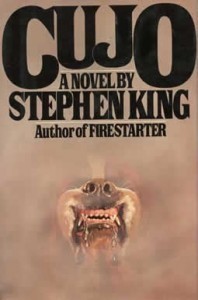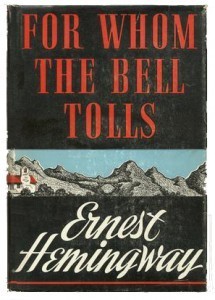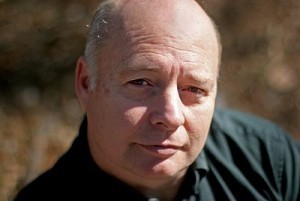Craig Lancaster's Blog, page 16
June 8, 2011
Another Page: 'Cujo'*
* — aka, "The Horror Novel That Isn't Really a Horror Novel Nor Is It Really About a Rabid and Murderous Saint Bernard"

Jim Thomsen
By Jim Thomsen
I never had a "Hemingway moment" as a kid, as most modern-day male writers have. Nor a Steinbeck one, though my inner road-tripper was mesmerized by Travels With Charley. My tastes tended toward Encyclopedia Brown and The Three Investigators, and trended in my young teens toward Clive Cussler's Dirk Pitt adventures and true crime. In retrospect, I see now that I liked (a) painless diversionary fare that (b) allowed me to project my own fantasies for dark adventure in a safe and silent way.
None of that explains why I felt a strange ping in my solar plexus the first time I picked up a Stephen King book. It was the fall of 1981, and I was a junior in a Christian boarding high school. And as a social maladroit, I spent large swaths of time staring out of my dormitory window being bored out of my Christian gourd.
 One of the fellow doinks in my dorm had lent me a stack of horror paperbacks, and the one on top was Cujo. I don't know why I even opened it, based on the back jacket copy: A big friendly dog chases a rabbit into a hidden underground cave—and stirs a sleeping evil crueler than death itself. A terrified four-year-old boy sees his bedroom closet door swing open untouched by human hands, and screams at the unholy red eyes gleaming in the darkness ….
One of the fellow doinks in my dorm had lent me a stack of horror paperbacks, and the one on top was Cujo. I don't know why I even opened it, based on the back jacket copy: A big friendly dog chases a rabbit into a hidden underground cave—and stirs a sleeping evil crueler than death itself. A terrified four-year-old boy sees his bedroom closet door swing open untouched by human hands, and screams at the unholy red eyes gleaming in the darkness ….
I am not a bit into tales of the supernatural, paranormal or extraterrestrial, so I am surprised that I bothered to crack the cover. I have always preferred tales of hardcore reality in everyday circumstances (which made my unfortunate side trip into Cussler-dom a blessedly brief one). Somehow I got past that and into the story, and discovered three things with the aforementioned zing:
Cujo is not really a story about a rabid, murderous dog. It's a nuanced, bittersweet, deeply real tale of anger, love, marriage and corrosive compromise.
The language. The voice. Oh, my God. I never knew that a writer's voice could be so original, so brimming with feeling, and yet so wise and crisp and literate. And so unaffected. And so awesome. Holy crap!
The characters come to fully realized life in a way I'd never seen in a novel before, and haven't all that often in the thousands of literary novels I've read in the thirty years since.
Oh, yeah, and No. 4. There's story, and there's more story, and then there's even more story.
Here's an example that encompasses all four of the above virtues … and it concerns a secondary character in Cujo, for crying out loud.
His grateful country had given him the Distinguished Service Cross. A grateful hospital staff in Paris had discharged him in February 1945 with an 80 percent disability pension and a gold-plated monkey on his back. A grateful hometown gave him a parade on the Fourth of July (by then he was twenty-one instead of twenty, able to vote, his hair graying around the temples, and he felt all of seven hundred, thank you very much). The grateful town selectmen had remanded the property taxes on the Pervier place in perpetuity. That was good, because he would have lost it twenty years ago otherwise. He had replaced the morphine he could no longer obtain with high-tension booze and had then proceeded to get about his life's work, which was killing himself as slowly and pleasantly as he could.
Now, in 1980, Gary Pervier was fifty-six years old, totally gray, and meaner than a bull with a jackhandle up its ass.
I find that just about perfect. It sets a scene. It establishes a character (a very Hemingway character, at that). It makes backstory, often a dreary undertaking for most writers, as fun as the front story. And it does so with remarkable insight in an utterly effortless shoot-the-shit tone. Most writers, I suspect, couldn't resist the self-conscious impulse to doll this up with prose with something purple like "puffy rolls of fishbelly flesh pitched and rolled on his ancient and agonized bones, fueled by nothing more thin blood and strong alcohol." Because, you know, in the literary tradition, seediness is next to godliness.
But that passage, as wonderful as it is, isn't really what the book's about. (I'm giving away very little when I say that Gary Pervier, the poor bastard, never makes it to fifty-seven.) Cujo is about two couples fighting mortal battles for the souls of their unions and their children. Vic Trenton is a man at the end of his tether, fighting to save his advertising business even as he fights a battle within himself about whether to keep his family intact in the aftermath of his wife Donna's confessed infidelities. Charity Camber is fighting to keep alive her dreams for her ten-year-old son's future from the coarse, alcohol-crushed clutches of her contentedly white-trash husband, Joe.
But none of these characters are as sympathetic — or unsympathetic — as they sound. Joe Camber isn't really a bad guy, and Donna Trenton is no shrewish whore. And that's the story with real people, as opposed to people usually found in literature. Most writers don't have the space or patience or skill to develop multi-dimensional characters. Genre writers are often too busy shaping the traits of their characters to the demands of their plots; literary writers are often more concerned with crafting perfect sentences to describe their characters than with the characters themselves.
King's talent, by contrast, is so ridiculously off the charts that he manages to have it every which way. He spends pages and pages on the turmoils in the Trenton and Camber households, and the reader doesn't notice that we haven't seen the rabid, eponymous Saint Bernard in twenty or so pages at any given time because King has crafted unbearable suspense in the spaces between the words of the husbands and the wives, making everything they say — and don't say — like a sprint through a minefield at darkest midnight.
An example:
They walked together to the stairs.
Donna asked, "So what comes next, Vic?"
He shook his head. "I just don't know."
"Do I write 'I promise to never fuck the local tennis bum again' five hundred times on the blackboard and miss recess? Do we get a divorce? Do we never mention it again? What?" She didn't feel hysterical, only tired, but her voice was rising in a way she didn't like and hadn't intended. The shame was the worst, the shame of being found out and seeing how it had punched his face in. And she hated him as well as herself for making her feel so badly ashamed, because she didn't believe she was responsible for the factors leading up to the final decision to fuck Steve Kemp — if there ever had been anything so thinking as a decision.
"We ought to be able to get it together," he muttered, but she did not mistake him; he wasn't talking to her. "This thing —" He looked at her pleadingly. "He was the only one, wasn't he?"
It was the one unforgivable question, the one he had no right to ask. She left him then, almost ran up the stairs, before everything could spill out, the stupid recriminations and accusations that would not solve anything but only muddy up whatever weak honesty they had been able to manage.
I can't help but think that most genre writers would never think to probe this part of their characters' psyches — and now, back to our gun-riddled chase scene, folks — and that most literary writers would dance around it, forsaking direct dialogue for deep searching studies of the strained planes of the patrician bones of Donna Trenton's face under her ashen skin and the allegedly immutable truths contained within each sweat-stung pore and puckered fold around the eyes. King cares, and cares and cares and cares, page after page after page.
 This is where his critics over the decades have gone horribly wrong: King is not a horror writer. He is a teller of stories about people whose character traits — the full messy buffet plate of them — emerge in horrific situations. Which, yes, sometimes involve vampires, telekinetic teens, underground creatures, postapocalyptic satanic figures and Chryslers possessed by the souls of cranky old men. And, of course, rabid Saint Bernards. And I say, so fucking what?
This is where his critics over the decades have gone horribly wrong: King is not a horror writer. He is a teller of stories about people whose character traits — the full messy buffet plate of them — emerge in horrific situations. Which, yes, sometimes involve vampires, telekinetic teens, underground creatures, postapocalyptic satanic figures and Chryslers possessed by the souls of cranky old men. And, of course, rabid Saint Bernards. And I say, so fucking what?
I could belabor the point, but the point here isn't to get into a critical dissection of Stephen King's man-of-letters credentials, it's to geek out about a book I loved at a time when I needed not only a quality diversion but also quality beyond diversion, as can only be needed by a boy at a time when he's trying to fumble his way toward being a man.
Not that the diversions themselves weren't lighting up my nerve endings. I can remember reading in the bed of my dorm room after lights-out, balancing a flashlight on my pillow, thoughts of sleep driven away by a surge of adrenaline as I took in passages like this:
She looked out the car window, saw the baseball bat lying in the high grass, and opened the car door.
In the dark mouth of the garage, Cujo stood up and began to advance slowly, blood-flecked head lowered, down the crushed gravel toward her.
"Come on then, motherfucker," she whispered.
It was twelve-thirty when Donna Trenton stepped out of her Pinto for the last time.
Thirty years later, I still get the chills when I read those few paragraphs. That is the power of Stephen King. The enduring power. Where's my flashlight?
Jim Thomsen is a freelance writer and manuscript copyeditor who lives near Seattle. His clients have included well-known crime authors Gregg Olsen, M. William Phelps and J.D. Rhoades. He is at work on The Last Ferry of the Night, a literary crime novel, among other projects, but he could always use more work to pay the bills. Reach him at thomsen1965@gmail.com.
June 7, 2011
Progress Report: 6/7/11
I'll be quick (there's an Anthony Weiner joke in there somewhere, but I'm not making it):
I'm close — so, so close — to finishing the last short story for a collection I've been working on for the past year. In fact, my plan is to move immediately from typing up this post to working on the story, so by the time you read this — about eight hours after I finish writing it — I may well be done. Then again, maybe I won't. At any rate, tell me how this grabs you for a title for the collection: Quantum Physics and the Art of Departure.
Copies of the Ed Kemmick book, The Big Sky, By and By , have been shipped out to early reviewers, final changes to the interior have been uploaded to the printer, and soon, books will be for sale. Please bookmark EdKemmick.com and visit it often. He'll be posting details there. The official release date is July 26.
I do have some news on the novel project I've been yammering about, but I'm going to save that for Thursday's Grab Bag. That right there is what we like to call a cliffhanger. Or a ripoff. Choose your nomenclature.
And finally …
Today, June 7, is the 30th birthday of my wife, Angie (pictured below during our recent trip to New York). I could say a million things about her, and I probably will eventually, but lately, I keep coming back to this: She believed in me when I didn't believe in myself. And that's seen us through some really difficult times. Happy birthday, sweetheart!

Angie at Ellis Island.
June 6, 2011
Once More, With Feeling: The Larry Burnett interview

Jim Thomsen
By Jim Thomsen
A few weeks ago, I shared some thoughts in this space about the not-quite-a-hit-single "Cinderella," (see below) recorded and released by the soft-rock band Firefall in 1976. As I wrote, it's a pretty tune wrapped around some shocking and seemingly misogynistic lyrics. (Cinderella, can't you see/I don't want your company/Better leave this morning, leave today/Take your love and your child away.)
Since then, as hoped for, the songwriter — Firefall band member Larry Burnett — agreed to talk to me about what's informed the song he wrote as a 16-year-old in 1968 — and what's continued to inform it in his private life and in the public consciousness. I think you'll enjoy this remarkably candid, self-effacing conversation with a musician who had a backstage ticket to the never-ending show that is classic rock.
Q: I've seen you discuss this in a few interviews that can be found online, but can you talk a little about what you saw around you as a teenager that led to the writing of "Cinderella"?
A: I, like so many (even my own son), come from a broken home (Mom left Dad when I was 4-ish). For most of my adolescent and adult life, all was filtered through a lens of betrayal and suspicion. It was easy to look around and notice lives going awry and against their own standards.
Q: Was the lyrical view of "Cinderella" typical or different from the themes expressed in other songs you wrote in those formative years? What were your obsessions of the time?
A: Other songs I wrote during my teen years sucked. I was mostly obsessed with narcotics and having sex with some forty-something divorcee in the neighborhood … or any female, for that matter. I didn't get laid until I was 18 and moved out of my folks' house. Nancy Neal … I'll never forget her. I actually crossed paths again with her when I was in Firefall.
Q: When the time came to choose songs for the first Firefall album, were there any misgivings within the band or the label about putting "Cinderella" on it? It seems quaint now, but it WAS 1976, and Middle America was still presumed to be churchgoing and innocent, and a song with "Goddamn, girl!" as the punchline passage must have at least raised a few eyebrows.
A: Once I wrote a song, I didn't really care how it was handled for "business reasons." For the single, Atlantic edited out the word "God" from "Goddamn", thinking that might help soften the impact. I was never a fan of softening the impact, but, like I said, I didn't really care.
Q: Feminists protested the playing of "Cinderella" on the radio, leading to it stalling out as a single just short of the Top 40, according to Firefall's Wikipedia site. What do you remember about that?
A: I remember everyone being surprised at that … bunch of men, what do you expect? Again, I write 'em as I see 'em. People react how they react. Some of the kindest words I've gotten regarding that song over the years have come from women. Why? I couldn't tell you, but kind words are kind words. I'll take them gratefully.
Q: In reading your 2008 blog, I saw that you came to be a father relatively late in life, and now have a son who's almost college age. How did you take the news that you were to be a father … and how did you take to BEING a father? How do you characterize your relationship with your son?
A: For many years I never saw myself as a husband or a father … and rightly so. As I healed up from years of drinking and drug addiction, my self-image began to shift to one in which I thought I actually had something to offer in those roles.
I have an astonishing relationship with my son and I believe that he would agree. I am driving to Connecticut on Saturday to see him in his last high school play (he is in them all, and quite the charismatic thespian, much to both of our pleasant surprises).
It was not as I had planned or hoped. His mother informed me that she did not want to be married to me anymore when he was about a year and a half old … and then had me removed from the house by the courts a week before his second birthday. I was deeply disturbed by it all, but figured as long as I didn't disappear, like my own father had, it would be, at least, better than my own experience.
So, I was as present as I could be. I saw him every few days throughout his childhood. We spent many series of days and nights together. I attended and was present for all the big moments. We vacationed together.
To her credit, his mother was a strong supporter of our relationship and time together, she just didn't want to be married to me.
Q: How does the man that you are now, nearing sixty, relate to the kid who wrote "Cinderella"? Can you imagine having that mindset today, living what you've lived? What would the 2011 Larry Burnett say about the 1968 Larry Burnett?
A: I can imagine anything … bit of a curse. "A little less self-absorption, son …"
Q: When you pull out a guitar and start to compose a song nowadays, what do those songs tend to want to be about?
A: Same ol' stuff … life and folks around me and the stories that lie therein … observing things (foibles, weakness, fear) that most won't self-observe out loud. I provide a service. Other writers that I bow down to provide that same service for me.
Q: You're still writing and recording music, and playing the occasional live gig, but as recently as 2008, you were working in a UPS store for $10 an hour. Do you think of yourself as a happy man, even content? Or are you still chasing after something?
A: Still chasing. Passes the time … and occasionally leads to some extraordinary music being made. I've actually had some pretty lucrative jobs over the years (classic rock on-air talent, transportation and logistics sales, copyediting) but my willingness to drop it all in pursuit of that chase has led me here.
Q: How do you look back on your Firefall days? Any big regrets, or do you see the journey — however it spun — as the destination, and every experience as a constructive learning moment? Could you take the stage with (Firefall bandleader) Jock Bartley and the others just as easily now as you did in 1975, or has there been too much time gone by and too much bad blood spilled?
A: I actually took the stage with Jock, Mark, David, Joe Lala and current members of Jock's ghost band in 2009 for a reunion concert. The concert went very well. Jock and I will never get along, (but) all that stops when we play … as it did in the '70s.
Regrets? Nothing that keeps me up at night or ruins my days. It all could have been handled better by us and those around us. We all did the best we could.
Whenever someone I am speaking with discovers that I was in Firefall (and many hundreds have over the years), I never have heard this: "Firefall? Yeah, I remember them. They sucked."
Postscript: I ordered the two CDs that Larry Burnett has recorded in the last decade, via CD Baby, and found them to be full of accessible, enjoyable acoustic folk-blues tunes. Take a listen and judge for yourself.
Jim Thomsen is a freelance writer and manuscript copyeditor who lives near Seattle. His clients have included well-known crime authors Gregg Olsen, M. William Phelps and J.D. Rhoades. He is at work onThe Last Ferry of the Night, a literary crime novel, among other projects, but he could always use more work to pay the bills. Reach him at thomsen1965@gmail.com.
June 3, 2011
The Word: Bucolic
The drill: Each week, I ask my Facebook friends to suggest a word. I then put the suggestions into list form, run a random-number generator and choose the corresponding word from the list. That word serves as the inspiration for a story that includes at least one usage of the word in question. This week's contribution is courtesy of Meredith Lucio. For previous installments of The Word, click here.
The woman shook her boy. Half awake, he reached out, grasping at her hazy specter in the early morning dark. He couldn't reach her.
"Tyler, get up and get dressed."
The boy agitated in the cocoon of blankets, dropping his heavy legs off the side of the bed. "What time is it?" She didn't answer. She was gone. The hall light lapped at the edge of the bedroom through the open door she had passed through.
The boy walked on the edges of his feet to the dresser and opened a drawer, rifling through it like a blind man. His searching hands found a pair of woolen socks, and he sat on the end of the empty bed, pulling them on.
"Go get him." The man's voice, biting off instruction to the woman, traveled down the hallway to the boy's ears.
"I just have to put on my shoes." The boy fumbled with the laces as his mother came back into the room.
"Come on now," she said.
"What's going on?"
"There's been an accident."
*****
The boy shivered in the backseat, worn flannel pajamas the only sentry between him and the cold, hard leather of the station wagon. He peered over the front seat at the clock in the dashboard. Four-twenty-three.
He could smell the vestiges of alcohol on his folks. They'd let him stay up till midnight to mark the new year, and his mother had sneaked him a taste of her whisky. He remembered now what she'd last said before sending him off to bed, how strange it sounded. He couldn't recall her ever saying such a thing.
"Let's hope this one's more bucolic than the last."
The gray slate of night still hung heavy in the car as the boy tried to clear his head of his cut-short sleep.
"Is it Trevin?" he asked, and instantly he felt stupid for having done so. Who else could it be? They were all accounted for. All of them except Trevin.
"What happened?"
The woman made a half-turn of her head and reached for her boy over the seat. He put his hand in hers.
"It was a crash, honey. We don't know anything else."
She gripped his hand. The boy looked in the rearview mirror. The lower half of his father's face twitched as he ground his teeth. He looked up and met eyes with the boy. The child smiled hesitantly, trying to send a signal – something, anything, that might give his father comfort. The man looked away.
Outside the car, a frozen morning chipped away at the fading night.
*****
The white lights and antiseptic hallways of the hospital could neutralize everything except the roiling fear of a fractured family, who until an early morning phone call had been four. Now they were divided — three anxious on one side of a wall and one in distress on the other.
A deputy sheriff met them in the waiting room and dutifully delivered an account that told much and revealed little. Trevin, traveling too fast on the ice-slicked county road. Trevin, trapped in his car, which had been contracted by the collision with the oncoming pickup. Trevin, still with a pulse but otherwise unresponsive, airlifted to the hospital.
But what of the rest of it, his father asked, meek-voiced. Where had he been? Who had he been with? Was he drinking? Had he fallen asleep? Did he know what was happening to him?
The deputy held his Stetson and repeatedly creased the brim: "I don't know, sir. You'll have to talk to the doctor about that. I'm terribly sorry."
They heard that repeatedly in the week that followed. The boy had never before contemplated the congruence of the words, the horrible yet perfect way they fit together.
"That's terrible."
"I'm sorry."
"I'm terribly sorry."
*****
The boy came to his mother and held his chin up. Wordlessly, she worked the tie in her fingers, fashioning the knot. The duty done, she clapped him on the shoulders and squeezed.
"You're a good boy."
He stepped through her vise grip and hugged her around the waist. She patted him on the back and then peeled him away. "We have to go. We'll be late."
They walked out the door, into the sun, joining the man in the black suit. He mashed out a cigarette with his foot and led them to the car.
June 2, 2011
Grab Bag: Unfashionable
I want to buy a cold drink for Stephen Harrigan and a copy of his new book for me.
And then I want to thank him for saying this:
"In terms of modernism, or postmodernism, or post-postmodernism, I tend to be a bit of a philistine. In reading and in art, I'm always drawn to what seems to be perpetually unfashionable: a narrative, a plot, a story, deep emotional feeling. I'm not interested in art that doesn't move me or stir me in some perceptible way."
That last sentence is the money part of the quote, and with it, Harrigan pinpoints why I've felt despair at some of the reading I've done in recent months. Barren, scorched, grotesque tales that in all their exquisitely tuned beauty of language crowd out things that are essential to my enjoyment of a story: cohesive narrative, some point other than the up-close examination of navel lint, and most of all, empathy for the characters on the page. That these sorts of stories are finding wide critical acclaim is a bit of a puzzlement to me, as my own take on them seems to set me outside the conventional wisdom of what constitutes good literary writing. That's not a place I'm used to being, or want to be. (And to answer the inevitable question: Is it professional jealousy? Well, fuck, yes. On some level. But that lies mostly in the envy over the reviews, not in my sense of the stories' merits.)
I've had some interesting conversations about this with my friend David Abrams, the tireless author and blogger at The Quivering Pen. His enjoyment comes from the richness of language, a sensation he once described to me as a "ping" that he feels when a sentence captures his fancy.
He describes that sensation in a recent blog post, where he extols a passage in Lamb, by Bonnie Nadzam:
There's something about the last sentence of the first paragraph in Nadzam's debut novel which snaps me to attention with its clear, clever imagery:
About the tops of upturned trash bins, black flies scripted the air.
I like the construction of the sentence, the specificity of the flies' blackness, and especially that verb "scripted."
I'm with him on the introductory prepositional phrase; it has pleasing cadence and imagery. With the rest of the sentence, I'm less impressed. The blackness of flies strikes me not so much as specific as stunningly obvious. And "scripted" is a leaden verb here, one that lands on the ear with a thud. For me, though, the question goes beyond a sentence. My interest in a work is more overarching. That's why I nod vigorously when I read these words, from screenwriter William Broyles Jr., about the aforementioned Mr. Harrigan:
"He's about as far from David Foster Wallace as you could get, and he's not as pitiless as Jonathan Franzen. But he has just a close and clear and unblinking ability to look at human behavior."
That's what I demand from my reading — particularly so the idea of "clear." My friend David, I know, requires the same. We just seem to find it in different places sometimes.
June 1, 2011
Another Page: 'For Whom the Bell Tolls'
By Ron Franscell
For Whom the Bell Tolls was the first Hemingway I ever read. I was a high school kid in the early 1970s, working on my campus newspaper, newly graduated from Jack London but not yet ready for Jack Kerouac.
To my young eyes, it was a good action story: Robert Jordan, the passionate American teacher, joins a band of armed gypsies in the Spanish Civil War. He believes one man can make a difference. The whole novel covers just 68 hours, during which Jordan must find a way to blow up a key bridge behind enemy lines. In that short time, Jordan also falls in love with Maria, a beautiful Spanish woman who has been raped by enemy soldiers. The whole spectrum of literature was refracted through the prism of my youth: Good guys and bad guys, sex and blood, life and death. For me, just a boy, the journey from abstraction to clarity was only just beginning.
 On the occasion of Hemingway's centennial in 1999, the Chicago Sun-Times asked me to reflect on For Whom the Bell Tolls. Re-reading it at 42 (roughly the age Hemingway was when he published it), I had lost my ability to see things clearly in black and white. My vision was blurred by irony, as I noted that two enemies, the moral killer Anselmo and the sympathetic fascist Lieutenant Berrendo, utter the very same prayer. For the first time, I saw that the book opens with Robert Jordan lying on the "pine-needled floor of the forest" and closes as he feels his heart pounding against the "pine needle floor of the forest"; Jordan ends as he begins, perhaps having never really moved. I certainly could never have seen at 16 how dying well might be more consequential than living well. And somehow the light had changed over those intervening 26 years, so that I truly understood how the earth can move.
On the occasion of Hemingway's centennial in 1999, the Chicago Sun-Times asked me to reflect on For Whom the Bell Tolls. Re-reading it at 42 (roughly the age Hemingway was when he published it), I had lost my ability to see things clearly in black and white. My vision was blurred by irony, as I noted that two enemies, the moral killer Anselmo and the sympathetic fascist Lieutenant Berrendo, utter the very same prayer. For the first time, I saw that the book opens with Robert Jordan lying on the "pine-needled floor of the forest" and closes as he feels his heart pounding against the "pine needle floor of the forest"; Jordan ends as he begins, perhaps having never really moved. I certainly could never have seen at 16 how dying well might be more consequential than living well. And somehow the light had changed over those intervening 26 years, so that I truly understood how the earth can move.
As a teen, I missed another crucial element, even though Vietnam was still a seeping wound. Three pivotal days in Jordan's life force him to question his own role in a futile war. He wonders if dying for a political cause might be too wasteful, but he ultimately believes that dying to save another individual is a man's most heroic act.
The book's title is taken from John Donne's celebrated poem: "No man is an Iland … and therefore never send to know for whom the bell tolls; It tolls for thee." It was not about loneliness and aloneness, as I once had thought, but about the seamless fabric of all life: What happens to one happens to all.
I am not blind to Hemingway's flaws. He was a good short writer, and what was short was almost always better. Pilar's tale on the mountainside has been widely acclaimed as the most powerful of Hemingway's prose. Her story within a story is nothing less than a contemporary myth.
For Whom the Bell Tolls has also been regarded as Hemingway's capitulation to critics who barked that his innovative style was too lean, and as a consciously commercial exercise for which Hollywood might (and did) pay handsomely. Robert Jordan, in so many respects, was a tragic mythical hero in the vein of Achilles, Gawain and Samson. For Whom the Bell Tolls ranks as one of the great American war novels in a country that has always struggled with the concept of good and bad wars — as we are at this very moment.
It also ranks among the stories — alongside John Fowles' The Magus and W.P. Kinsella's Shoeless Joe — that made me want to be a writer. It was simple: I wanted to make people feel the way Hemingway made me feel. Only time will tell if I chose correctly.
Ron Franscell is the bestselling author of THE DARKEST NIGHT and DELIVERED FROM EVIL. His next book, THE SOURTOE COCKTAIL CLUB, will be published in October by Globe Pequot Press.
May 31, 2011
Progress Report: 5/31/11

I want to go back.
Still coming out of my post-New York coma, so I'll be (relatively) brief …
Copies of the Ed Kemmick book, The Big Sky, By and By , have been bundled up for reviewers and will go out this week. Release date is July 26.
I'm plug, plug, plugging away at the new novel project. This is all a little inside baseball, so if that's not your cup of tea, go here for something more interesting. … OK, still here? I'm trying something new with this book. I have a basic idea of where it's going to go, but I'm outlining only a few scenes at a time — four or five. Once those are written, I assess where the story is and consider new threads that have emerged — those always happen — and then sketch out a few more scenes. With 600 Hours of Edward and The Summer Son , I plotted a bit more aggressively at the outset, and while I'm happy with both books, they perhaps missed a little bit of the spontaneity that I'm experiencing with this project. It's kept the slogging — that awful point in a first draft where you're several thousand words in and have many thousands yet to go — from being a total drag.
I hope you're keeping up with my weekly project, The Word. I'm having a ton of fun with that. You can also see the stories at my page on Fictionaut.
May 30, 2011
Once More, With Feeling: 'Ballad of the Green Berets'
A hearty thank you to all who served, and all who gave everything.
May 27, 2011
The Word: Prurient
The drill: Each week, I ask my Facebook friends to suggest a word. I then put the suggestions into list form, run a random-number generator and choose the corresponding word from the list. That word serves as the inspiration for a story that includes at least one usage of the word in question. This week's contribution is courtesy of Kathy Price. For previous installments of The Word, click here.
When Rusty says to me, "Look, Veronica, I want you to know that my interest in you isn't strictly prurient," I'm certain of two things.
First, I like him. I really, really like him in a way that I don't like guys, not anymore, not after all the dirty lies into get in my pants, the dirtier lies to get out of them later, the indignities and the humiliations and the disappointments. Which isn't to say that I've lost interest in guys. Guys are wonderful things in moderation, or so I hear. I haven't yet mastered moderation in much of anything, and certainly not guys, but there's still time, I think, which is why I try not to like them, Rusty aside.
Second, he's lying, just like so many guys before him, which surprises me exactly not at all. The thing is, I can't tell if this is the sort of lie that will lead where so many other lies have led, to my feeling broken and used and tossed aside, or if there is something more to this lie, some glimmer of belief on Rusty's part that there is something in me worthwhile, something he wants to get closer to before he has to tell the truth and admit to me that, yes, his interest in me is strictly prurient but that I'm also an awesome chick and he knew it all the time. I would be OK with that, and somehow, I have to let him know.
He looks a little bit like Jeff. That was what I noticed when Rusty first talked to me last week here at the Libertine. It's the way his jaws come together in a perfect point at his chin, as if the pieces of his face are locked together like Legos. I didn't want to talk to Rusty at first because of this, because Jeff was horrible to me, and Rusty reminded me of him. Jeff threw an alabaster vase full of potting soil at me, directly at my head, and only because he can't even get something like that right did it miss and shatter instead against the refrigerator. It fell to the linoleum in my kitchen, a debris trail of broken glass and dirt and plant life heading for death. I left it there for a week, long after Jeff left for good, because it was the only vestige I had of him. It took me a long time to get over that, and Rusty looking like Jeff was a mark against him from the start. But then he smiled, something Jeff rarely did, and I saw that he didn't look so much like Jeff at all. That was good, and so I smiled, too.
Rusty told me that he was an obesity researcher at the Southwestern Medical Center, and I believed him, and I never believe guys. But come on, obesity researcher? Nobody would make up something like that. I pointed at a fat bitch at the end of the bar and suggested that he talk to her instead, and he laughed and said it wasn't like that, and anyway, something called Occam's Razor told him that if she drank light beer and avoided the Hog Wings, her problem would probably be less acute. I asked him what the fuck Occam's Razor is, and he laughed again and told me that was a tool of deduction, whatever that is.
Anyway, tonight, he came back to the Libertine, and he remembered me and I remembered him, and we've been chatting – chatting, what a silly word – for a few hours and now he's telling me that his interest in me isn't "strictly prurient." I still think he's adorable and I still think he's lying, but I don't need to sort any of that out tonight, do I?
"What is your interest, strictly speaking?" I ask.
"To walk you home," he says.
"It's a long walk."
"No, it isn't."
"How do you know?"
"You told me, last week. You said it's two blocks away, right here on Greenville. Were you lying?"
I wasn't lying.
"I wasn't lying," I say.
"So are you ready to go?" he asks.
I am.
"I am," I say.
November slaps us dead in the face as we leave the Libertine, and he asks if he can put his arm around me seeing as how it wasn't this cold when he came in and he didn't bring a jacket to offer me.
"Yes," I say.
And we're walking, and his arm has pulled me in closer, and I can smell him now, can smell the Irish Spring he scrubbed onto his body this morning. I like it. I like him. He's beautiful and he likes me back. Still I'm cold, and Rusty says he heard there's supposed to be an ice storm coming.
And I think, ice storm or not, I'm not bringing the plants in off the terrace.
May 26, 2011
Grab Bag: The MFA effect
First: Read this story in Salon, provocatively titled "Are MFA programs ruining American fiction?" (I'll end the suspense now and tell you that the piece doesn't answer the question in any substantive way.) Then come back and I'll share my meager thoughts.
I was fascinated to read that article because it's a topic my good friend Jim Thomsen and I bandy about with some regularity. I'm afraid we're no closer to an answer than anyone else is, and we probably never will be.
As the article itself points out, for every citation one can make that MFA programs are herding American letters into stultifying sameness that's slavish to style, there's an MFA holder who is writing superb, accessible, popular fiction:
Still, you can publish adventurous work without an MFA, as Jennifer Egan has repeatedly proven, and MFA programs have also produced writers with great popular appeal, such as Michael Chabon.
What I have found is that there is a certain kind of writing — affected, self-reverential, beautifully constructed but stripped of soul — that I sometimes wander across, and sure enough, I flip over to the "about the author" section, and the writer holds an MFA. But just as often, I'll read something that moves me seemingly without effort, and that writer will turn out to have an MFA, too.
This is one of those areas where regardless of where you stand, ammunition is at the ready to bolster your point. I'm just not certain that either side is right, or wrong. Mostly, I find myself nodding in vigorous agreement with the author of the piece, Laura Miller, when she notes that "I must confess to being completely indifferent to the ongoing MFA controversy." Snootier-than-thou MFA types annoy me. So do artless genre hacks. And Washington Redskins fans. Whatever.
The thing I can say with certainty is that I despise any tendency to put storytelling in a box. To the camp that says MFA-fueled writing, categorically, is better, I say: Steinbeck. Hemingway. Egan. Evison. To the camp that finds literary writing to be too high-falutin', I say: Read some Chabon, or Roth, or Wolff, or O'Connor and get back to me.
Jim, on the other hand, sees some real danger in the MFA-ification of American letters. Read on:

Jim Thomsen
My objections to "MFA writing" can be boiled down to a few key thoughts.
One, most of the MFA writing I've read has a dreary sameness. It's almost all arid, airbrushed, emotionless prose drained of all blood and heat and light, as cold and perfect as the surface of a stainless-steel toilet. It seems to promote the idea that the sentence-crafting matters more than storytelling, which is a disturbing idea to promote in the world of writing, you know, stories. And that seems to come from the open boot-camp atmosphere of MFA classes and workshops, in which works are presented to peers and often mercilessly perforated, leading to rewriting that seems passive and even defensive, written specifically to avoid drawing classmate-driven scorn.
All that heavily implies that, two, an orthodoxy has been imposed on all such writing and that, as one commenter on Laura Miller's essay put it: "Those who do not conform are locked out." And that leads to three, which answers the question, "Locked out of what?" That answer: Many of the most prestigious and best-paying literary journals and publishing houses, and the critical establishment that moves in lockstep with it. It's a scary idea, and a distinctly un-American one, this reality that, often, literature is not judged on its merits but by its pedigree.
Four: The idea that getting right out of college and cocooning oneself in an MFA program seems antithetical to the idea — and, I submit, the established fact — that the best writing AND storytelling stem from wisdom and perspective gained from actually being out in the world and experiencing a rich sampling of what's best and worst about it. You have talent and want to write? Join the Army. Take a freighter to Argentina. Spend a month in a county jail. Fight wildfires in the high Sierras. Play minor-league baseball. Work a season on a sorghum farm in Saskatchewan. Spend a year in an Israeli kibbutz. Do some fucking thing. Just, you know, LIVE. Otherwise you're just trading on trite and overthumped themes and subjects: Daddy Didn't Love Me Enough. My Parents Divorced Sixteen Years Ago And I Still Can't Get Over It. The Boy Who Drove Me To Bulimia In Eighth Grade. My Freshman-Year Existential Crisis. Sartre And Small Boobs Ruined My Life. The Weird Homeless Guy Outside The Dairy Queen.
And five, the MFA program simply isn't available to poor people. It's a form of literary redlining. You can't get in without a bachelor's degree, which many of us spend years paying off if Mom and Dad aren't footing the bill. And all the fellowships and teaching gigs in graduate school won't come close to covering your tuition, housing and daily living expenses. All of which is fine for those who are willing to do it but not so fine for those of us who can't do it and have to settle for being told that we can't be in The New Yorker or Glimmer Train or reviewed in The New York Times because of it.
Six is really one, but it bears repeating: MFA writing is largely BORING writing. And boring writing is always bad writing. Bad writing should never be rewarded, particularly to the exclusion of all other kinds.








